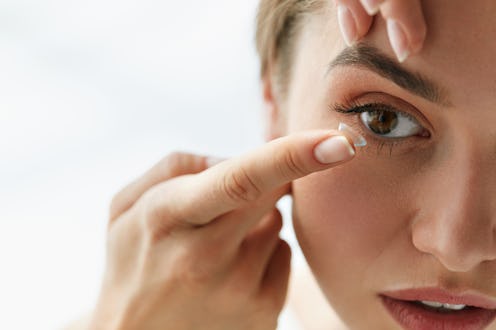Life
A Rare, Blindness-Causing Infection Is On The Rise For Contact Wearers, A New Study Says

Contact lens wearers may be at risk for an infection that can lead to blindness, a small new study says. Published in the British Journal of Ophthalmology, the new report states that a recent outbreak of a rare eye infection, called Acanthamoeba keratitis, has dramatically increased in southeast England since 2011. According to a recent press release, reusable contact lens wearers who reported subpar contact lens hygiene — either from an ineffective lens solution, water contamination, or otherwise not cleaning their contacts sufficiently — were more likely to report the infection.
The press release further states that Acanthamoeba keratitis is a cyst-forming microorganism that causes the cornea, located on the front surface of the eye, to become inflamed. The infection can happen to anyone, but researchers state that contact lens wearers are especially at risk. Leady study author, Professor John Dart, of the Institute of Ophthalmology and Moorfields Eye Hospital, was quoted in the press release as saying that “This infection is still quite rare, usually affecting 2.5 in 100,000 contact lens wearers per year in southeast England, but it’s largely preventable. This increase in cases highlights the need for contact lense users to be aware of the risks.” The Independent also reports that, in addition to poor contact lens hygiene, showering or swimming with contacts in is also a risk factor for the severe but preventable eye infection.
According to the press release, about 25 percent of people affected by the eye disease wind up with less than 25 percent of their vision following infection. Others within that group become totally blind and/or require long-term treatment. More than 25 percent of those affected by the illness also require corneal implants in order to regain their vision.
The Independent further reports that cases of the eye disease have nearly doubled between 2011 and 2016 in the UK, where Acanthamoeba keratitis is found in high levels in the domestic water supply. Professor Dart told The Independent that “People who wear reusable contact lenses need to make sure they thoroughly wash and dry their hands before handling contact lenses, and avoid wearing them while swimming, face washing, or bathing.”
According to a 2017 report released by the Centers for Disease Control (CDC) about 80 percent of contact lens wearers in the U.S. report behaviors such as sleeping with contacts in, reusing contact lens solution, ignoring replacement schedules, sharing lenses, and poor overall contact lens hygiene, that put them at risk of an eye infection. Prevent Blindness further reports that contact lenses, while a great alternative to glasses for vision correction, do carry certain risks if they’re not cleaned and handled properly.
Per the recent study, Acanthamoeba keratitis, while potentially serious, is preventable. The study’s authors state that the current UK outbreak is likely due to a combination of risk factors, but if you do wear contact lenses, your safest bet is daily disposables. If you prefer reusables, however, make sure to always wash your hands before handling your lenses, avoid contact with water, and make sure to cleanse them well with a good contact lens solution in order to avoid infection.